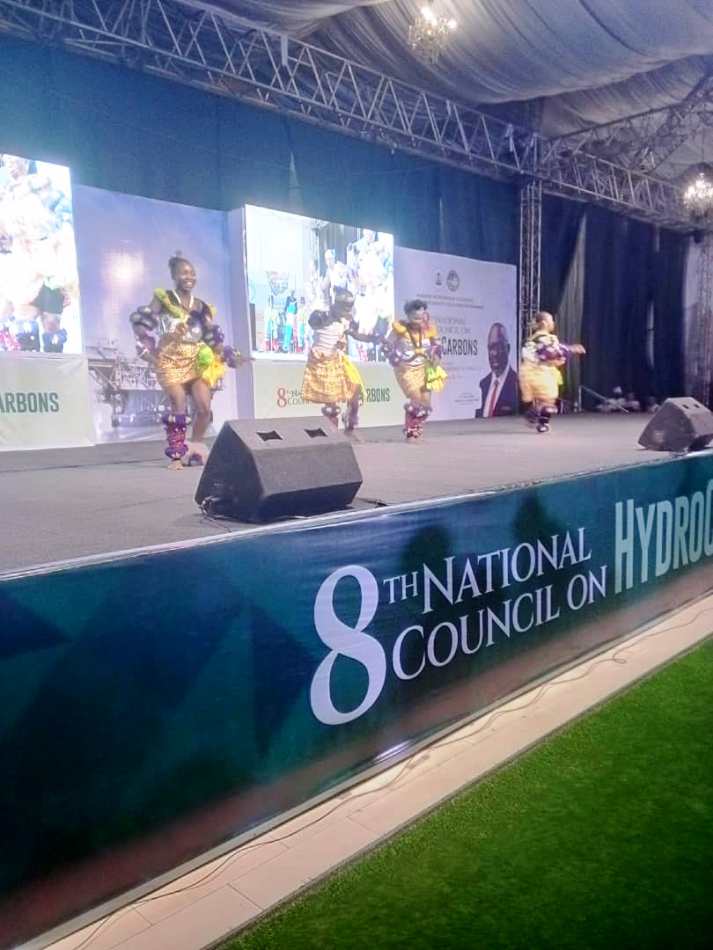FIC Report (Delta State) – The 8th National Council on Hydrocarbons with the theme: “The Petroleum Industry Act (PIA) 2021: The Journey So Far”, organised by the Ministry of Petroleum Resources in collaboration with the Delta State Government as the Host State, has been held in Asaba the State capital.
In his key note address, the Hon. Minister of State Petroleum Resources (Oil) Sen.Heineken Lokpobiri noted that the National Council on Hydrocarbons ( NCH) is an annual event of the Ministry of Petroleum Resources which commenced in 2016 and has been sustained till date.
The Hon. Minister of State ( Oil) who was represented at the closing ceremony by the Permanent Secretary Ministry of Petroleum Resources, Amb. Nicolas Agbo Ella, stated that the Council was established to garner ideas to enhance good policy formulation and implementation in the Oil and Gas ( Energy) Sector.
According to him, the PIA was passed into law in 2021 after a long journey of over two decades, asserting that its proper implementation is expected to turn around not only the fortune of the energy Industry but the entire Nation.
The Hon. Minister of State ( Oil) further noted that the theme of this year’s Council “The Petroleum Industry Act (PIA),2021: The Journey so far” was the right choice of discourse as according to him, the Petroleum Ministry at the moment, was reviewing the gains and challenges witnessed so far with the coming on board of the Act.
The World, Hon. Lokpobiri noted, is transiting from fossil fuels into renewables with emphasis on promotion of credible and responsible use of energy, adding that the industry must therefore operate on a regulatory friendly environment that would engender maximum profit for the nation. He added that the Act would reposition the Industry to full business entity where private investors would be allowed to operate profitably.
He however noted that after two years of operation of PIA, the scale of areas that needed to be addressed have become widespread and profound, therefore over hauling the Act would cover identified gaps and give room for a better implementation.
The Minister identified the objectives of the PIA to include; fostering a business environment conducive for petroleum operations, encouraging and facilitating both local and foreign investment in the petroleum industry.
He pointed out that the key approach forwards achieving these objectives include the reduction of tax and royalty rates, creation of host Communities’ development funds for harmonies co- existence and improving ease of doing business by repealing conflicting laws while enhancing the governance and regulatory environment.
Speaking on the expectation that PIA would have a positive impact on the ability of the sector to attract investments, the Minister highlighted the need to monitor the changes and keep the provisions under review in line with evolving business realities and the stiff competitive environment for investments. The transition and implementation phase he noted, would be key in ensuring that the objectives of PIA were achieved.
He stated that the new Petroleum Industry Act (PIA) repealed 10 Acts of the National Assembly relating to the Oil and Gas Industry and consolidated the laws into a single Act.
The Hon. Minister of State (Oil) maintained that the Petroleum Industry was critical to Nigeria’s monetary and fiscal policy environment, adding that the performance of the petroleum industry influence the direction of government fiscal policy and monetary interventions more than any other sector of the economy.
He also noted that the Act introduced the Host Community Trust Fund, with the host communities as direct beneficiaries of resources within their domain a provision he stated leads to development and well-deserved prosperity for their people. The Minister further pointed out that the creation of an environmental remediation fund with monies to be set aside by licensees and independently managed would address the demands of host communities on environment disgredation due to exploration activities.
The Minister concluded by noting that the changes being introduced and the specific amendments targeted at encouraging local content would have a positive impact especially in the medium to long term period for indigenous players in the Nigerian Oil and Gas industry. He expressed optimism that deliberations from the 8th National Council would help in development of guidelines to fully transit to the PIA as he urged participants to be focused in taking decisions on the several memoranda presented to the Council and reminded participants and stakeholders that the decisions they take would affect positively or otherwise the future of the Petroleum Industry.
He expressed profound gratitude and appreciation to the Executive Governor, Rt. Hon. (Elder) Sheriff Oborevwori and the good people of Delta State for hosting the 8th National Council on Hydrocarbons and providing conducive environment and resources which he acknowledged, culminated in the success of the Council.
In his remarks, the Executive Governor of Delta State, His Excellency, Rt Hon.(Elder) Sheriff F.O Oborevwori said Delta State Government was proud to host the 8th Meeting of the National Council on Hydrocarbons, pointing out that the event of the 8th National Council on Hydrocarbons which began three days earlier were testaments to the collective commitment to harnessing the vast potential of Nigeria’s hydrocarbon resources for the benefit of the nation.
The Governor who was represented by the Secretary to the State Government (SSG) Dr . Kingsley Emu, commanded the participants’ participation, thoughtful contributions and dedication while expressing optimism that their presence at the 8th National Council on Hydrocarbons underscored the importance of collaboration in driving Nigeria’s economic growth and development. He assured participants and stakeholders that Delta State remained committed to supporting the growth of the hydrocarbon sector.
The Governor reiterated that as the highest producer of hydrocarbons, Delta State recognised the pivotal role the petroleum industry plays in shaping Nigeria’s economy, adding that his administration was dedicated to creating an enabling environment for its continued prosperity.
Going forward the Governor noted, “we must remain steadfast in our pursuit of excellence, innovation and sustainability. Together, we can overcome the complexities of the hydrocarbon landscape and unlock its full potential for the benefit of our people”, the Governor concluded.
Earlier, in a welcome address at the opening ceremony, the Hon. Commissioner for Oil and Gas Delta State, Hon. (Chief) Peter Okagbare Uviejitobor while welcoming delegates and participants to the 8th National Council on Hydrocarbons, expressed appreciation to the Governor, His Excellency Rt. Hon. (Elder) Sheriff Oborevwori for graciously approving Delta State as Host and providing the needed logistics for the success of the event.
He noted that the Petroleum Industry Act 2021, marked a landmark achievement in Nigeria’s quest for a transparent, efficient and environmentally concious oil and gas sector, adding that the legislation did not only seek to reform the Industry but also aimed at creating a conducive environment for investment, enhance regulatory frameworks and promote local content development aimed at ensuring that host Communities are accorded their right of place in the Sector.
The Oil and Gas Commissioner further noted that as a major hub of oil production and activities in Nigeria, Delta State has a vested interest not only in the effective implementation of the Petroleum Industry Act but also in the benefits of the abundant hydrocarbons that are felt by the host Communities, enhancing their social-economic well-being and fostering sustainable development.
Hon. (Chief) Uviejitobor who acknowledged the importance of collaboration between government, the Industry and host communities in achieving the industry’s goals, however, expressed concern that the absence of a defined role and seeming non-recognition of state governments in the Petroleum Industry Act must be reviewed.
He encouraged participants and members of constituted Host Community Development Trusts and Oil Companies to actively defend their memoranda, contribute to the conversations, share their experiences and propose innovative solutions that would shape the future of the Petroleum Industry.
Also, in his welcome remarks, the Permanent Secretary, Ministry of Petroleum Resources, Amb. Nicolas Agbo Ella who was represented by the Director Planning, Research and Statistics and Chairman of the Organising Committee, Usman Abdulkadir, expressed profound appreciation to the Government and good people of Delta State for the adequate logistics provided to ensure the success of the meeting. He also expressed appreciation to all stakeholders for finding time to attend the 8th Session of the NCH.
Amb. Agbo Ella noted that the mission of his Ministry was to deliver a thriving Oil and Gas Industry for Nigeria, stressing that the mandate and mission of the Petroleum Resources Ministry could only be achieved when good and implementable policies were formulated and implemented to the letter.
The Permanent Secretary disclosed that Federal Government through the Ministry of Petroleum Resources had commenced positive action on Gas Commercialisation and flaring noting that it has started yielding results. Amb. Agbo Ella added that the 8th Council was expected to further enhance steps taken by bringing new ideas that would make the Country realise fully, the potentials in this natural resource. He further stated that the Federal Government was making efforts to popularise the use of gas for domestic purposes, enhance cleaner energy and also reduce deforestation in the Country.
He reminded delegates and participants that suggestions and recommendations from the gathering would directly or indirectly affect people from the Oil and Gas Sector, Communities, Ministries/Agencies and the Nation at large.
Amb. Agbo Ella, therefore, urged delegates and participants to objectively and critically examine all memoranda submitted to ensure that they make quality recommendations to the Council.
Signed
Celestine Afokobah
FIC Asaba







